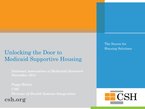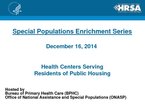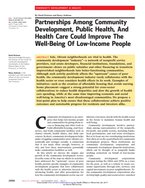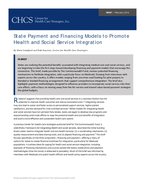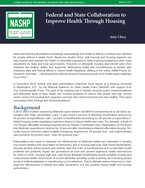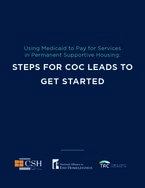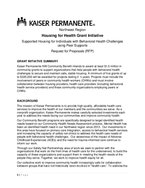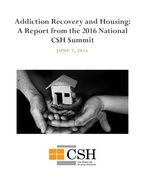Found 32 resources.
0
0
0
Looking largely at the 2020-2021 school year, the report is chock-full of information about how schools apply research-based strategies in a variety of different contexts – from very different school systems across multiple states – to make research translate into positive experiences and outcomes for students and their teachers in three critical areas:
• Instructional work, where math or English-language-arts teams, including instructional coaches, special-education teachers, and English learner/multilingual teachers, work to improve the quality of instruction within classrooms.
• Early...
Topics: Advocacy, Attendance, Child welfare, CLPHA, Community development, Education, Grade-level proficiency, Housing, Literacy, Low-income, Partnerships, Place-based, Supportive housing, Sustainability, Youth
 Shared by Karina George
on Jun 29, 2022
Shared by Karina George
on Jun 29, 2022 1
0
0
The Administration for Community Living’s Aging and Disability Network is a multifaceted service infrastructure for older adults and people with disabilities so they can find housing and obtain services like chore assistance, delivered meals, and transportation. By partnering with this community infrastructure, PHAs can improve voucher utilization and leverage and align resources so older adults, people with disabilities, and people experiencing homelessness —all priority populations for federal housing assistance—can obtain supportive services needed to attain housing stability, optimize...
Topics: Advocacy, Community development, Disabilities, Health, Housing, Partnerships, Research, Seniors, Supportive housing, Sustainability
 Shared by Karina George
on Jun 17, 2022
Shared by Karina George
on Jun 17, 2022 0
0
0
The role of public and nonprofit hospitals and hospital systems in supportive housing is not an obvious one at first glance. Traditionally, the role of nonprofit and public hospitals has been to provide primary healthcare and additional health services to the public, often to select “catchment” areas or neighborhoods. The extent of these institutions’ role in housing was limited to either providing a) short-term inpatient beds for medical or treatment services, or b) residences for nurses or other hospital staff. Why then are more and more nonprofit and public hospitals becoming involved in...
Topics: Health, Homelessness, Housing, Partnerships, Research, Supportive housing
 Shared by Housing Is
on Apr 17, 2019
Shared by Housing Is
on Apr 17, 2019 0
0
0
The Keeping Families Together model turned the usual paradigm for prioritizing affordable housing on its head. Rather than targeting the most “stable” families, Keeping Families Together sought out families with the most complicated cases—those at greatest risk. Thanks to this approach, families once on the brink of crisis now have a permanent place to call home, as well as the services and support they need to stay together.
Topics: Child welfare, Family engagement, Homelessness, Housing, Low-income, Partnerships, Research, Supportive housing
 Shared by Housing Is
on Apr 4, 2019
Shared by Housing Is
on Apr 4, 2019 0
0
0
The Housing and Medicaid Services Pilot Program in Indianapolis, also known as the Blue Triangle Housing Program, is a collaboration that includes Anthem, the City of Indianapolis, a non-profit housing organization, and a community mental health center (CMHC).
Topics: Health, Housing, Medicaid / Medicare, Midwest, Partnerships, Supportive housing
 Shared by Housing Is
on Apr 4, 2019
Shared by Housing Is
on Apr 4, 2019 0
0
0
CSH selected the Center for Data Science and Public Policy (DSaPP) at the University of Chicago to develop a web-based data integration tool, which was completed in 2018. The tool connects county jail administrative data from the justice system to homeless system data, through communities’ Homeless Management Information Systems (HMIS).
Topics: Criminal justice, Data sharing, Homelessness, Housing, Midwest, Partnerships, Supportive housing
 Shared by Housing Is
on Apr 4, 2019
Shared by Housing Is
on Apr 4, 2019 0
0
0
A new collaboration of San Francisco Bay Area foundations and businesses is raising $540 million to tackle the region’s affordable housing crisis.
Topics: Community development, Health, Housing, Low-income, Partnerships, Supportive housing, West Coast
 Shared by Housing Is
on Jan 28, 2019
Shared by Housing Is
on Jan 28, 2019 0
0
0
Webinar slide deck that provides a brief overview of FUP, building blocks of successful FUP voucher implementation, facilitated panel on increasing impact and enhancing FUP operations, and other opportunities and resources.
Topics: Child welfare, CLPHA, Foster care, Funding, Housing, Legislation & Policy, Low-income, Partnerships, Preventative care, Safety, Supportive housing, Youth
0
0
0

People with mental health disabilities are vastly overrepresented in the population of people who experience homelessness. Of the more than 550,000 people in America who experienced homelessness on a given night in 2017, 1 in 5 had a mental illness. The proportion of people experiencing chronic homelessness with mental health disabilities was even higher—nearly 1 in 3. Despite this fact, the reality is that most people with mental illness fortunately do not experience homelessness: While about 20 percent of all adults in the United States have a mental illness, less than two-tenths of 1...
Topics: Depression, Disabilities, Homelessness, Housing, Legislation & Policy, Low-income, Mental health, Partnerships, Preventative care, Stability, Substance abuse, Supportive housing
0
0
0
Partnerships between medicaid and supportive housing providers
Topics: Cost effectiveness, Funding, Health, Legislation & Policy, Low-income, Medicaid / Medicare, Partnerships, Supportive housing
 Shared by Housing Is
on Aug 9, 2018
Shared by Housing Is
on Aug 9, 2018 0
0
0
Introduction to supportive housing and notes from the field
Topics: Health, Housing, Low-income, Medicaid / Medicare, Mental health, Partnerships, Supportive housing
 Shared by Housing Is
on Aug 9, 2018
Shared by Housing Is
on Aug 9, 2018 0
0
0
The Colorado Coalition for the Homeless created the Denver Housing First Collaborative (DHFC) in 2003 with funding provided by a collaboration of federal agencies. The DHFC involved CCH as the lead agency, Denver Department of Human Services (DDHS), Denver Health (DHHA), Arapahoe House, the Mental Health Center of Denver (MHCD) and the Denver VA Medical Center. The DHFC is designed to provide comprehensive housing and supportive services to chronically homeless individuals with disabilities. Initial federal funding created the capacity to house and serve 100 chronically homeless individuals...
Topics: Cost effectiveness, Funding, Health, Homelessness, Housing, Pacific Northwest, Partnerships, Research, Stability, Supportive housing
 Shared by Housing Is
on Aug 9, 2018
Shared by Housing Is
on Aug 9, 2018 0
0
0
Social determinants of health are the economic and social conditions that affect health outcomes and are the underlying, contributing factors of health inequities. Examples include housing, educational attainment, employment and the environment.
Topics: Affordable Care Act, Disabilities, Health, Homelessness, Housing, Low-income, Medicaid / Medicare, Mental health, Partnerships, Place-based, Substance abuse, Supportive housing
 Shared by Housing Is
on Aug 9, 2018
Shared by Housing Is
on Aug 9, 2018 0
0
0
We sought to learn more about how state- and locally funded rental
assistance programs were created, how they are structured, whom they serve, and how they are funded.
Topics: Cost effectiveness, Data sharing, Disabilities, Family engagement, Funding, Health, Homelessness, Housing, Legislation & Policy, Low-income, Partnerships, Research, Supportive housing
 Shared by Housing Is
on Aug 1, 2018
Shared by Housing Is
on Aug 1, 2018 0
0
0
Topics: Asthma, East Coast, Health, Healthy homes, Housing, Low-income, Partnerships, Supportive housing
 Shared by Housing Is
on Jul 27, 2018
Shared by Housing Is
on Jul 27, 2018 0
0
0
On January 1, 2014, in states that have chosen to expand Medicaid eligibility under the Affordable Care Act, nearly all chronically homeless people who lacked health insurance became eligible for Medicaid. This Primer offers state Medicaid officials and other interested parties strategies for using Medicaid to meet the needs of this very vulnerable population--some strategies that have succeeded in the past and some that are emerging under provisions of the Affordable Care Act.
Topics: Affordable Care Act, Criminal justice, Disabilities, Dual-eligibles, Funding, Health, Homelessness, Housing, Low-income, Medicaid / Medicare, Mental health, Partnerships, Stability, Substance abuse, Supportive housing
 Shared by Housing Is
on Jul 27, 2018
Shared by Housing Is
on Jul 27, 2018 0
0
0
The community development “industry”—a network of nonprofit service providers, real estate developers, financial institutions, foundations, and government—draws on public subsidies and other financing to transform impoverished neighborhoods into better-functioning communities. Although such activity positively affects the “upstream” causes of poor health, the community development industry rarely collaborates with the health sector or even considers health effects in its work. We propose a four-point plan to help ensure that existing and future collaborations achieve positive outcomes and...
Topics: Community development, Food insecurity, Funding, Health, Low-income, Partnerships, Supportive housing, Transportation
 Shared by Housing Is
on Jul 24, 2018
Shared by Housing Is
on Jul 24, 2018 0
0
0
States are realizing the potential benefits associated with integrating medical care and social services, and are beginning to take the first steps toward developing financing and payment models that encourage this connection. This brief, made possible by The Commonwealth Fund, reviews potential financing mechanisms to facilitate integration, with a particular focus on Medicaid. Drawing from interviews with experts across the country, it offers models ranging from one time seed funding for pilot projects to blended or braided financing arrangements that support comprehensive integration. The...
Topics: Cost effectiveness, Funding, Health, Medicaid / Medicare, Partnerships, Supportive housing
 Shared by Housing Is
on Jul 23, 2018
Shared by Housing Is
on Jul 23, 2018 0
0
0
In December 2016, federal and state policymakers examined health and housing issues at a meeting convened in Washington, D.C., by the National Academy for State Health Policy (NASHP) with support from The Commonwealth Fund. The goal of the meeting was to identify concrete policy recommendations and actionable steps to align health and housing programs to ensure that people with high service needs receive the housing and supportive services they need to become and stay healthy. This report summarizes their findings and recommendations
Topics: Data sharing, Disabilities, Health, Homelessness, Legislation & Policy, Low-income, Medicaid / Medicare, Partnerships, Supportive housing
 Shared by Housing Is
on Jul 19, 2018
Shared by Housing Is
on Jul 19, 2018 0
0
0
This guide is organized around five steps, each of which includes concrete ways to get started as well as links to additional resources. These five steps will help you build a case for why and how Medicaid can be structured at the state and local levels to pay for services in permanent supportive housing. When building a case you need to know some basics of Medicaid and the types of services you want Medicaid to cover. in order to convince Medicaid administrators and other health care payers to support your efforts, you need to have evidence of need for and impact of supportive housing and...
Topics: Affordable Care Act, Data sharing, Funding, Health, Homelessness, Medicaid / Medicare, Partnerships, Supportive housing
 Shared by Housing Is
on Jul 13, 2018
Shared by Housing Is
on Jul 13, 2018 0
0
0
This paper offers strategic guidance in building, assessing and/or strengthening various types of partnerships between Health Center Program Grantees, behavioral health providers and supportive housing providers. Whether you represent one of these types of organizations or you are merely curious about health and housing partnerships, you can use this guide as your roadmap.
Topics: Data sharing, Dual-eligibles, Health, Low-income, Medicaid / Medicare, Partnerships, Supportive housing
 Shared by Housing Is
on Jul 13, 2018
Shared by Housing Is
on Jul 13, 2018 0
0
0
Recognizing the layers to developing a health and housing partnership, this Literature Review and Resource Bank is intended to provide background and data resources that can be used in grant applications or in conversations with potential funders in the effort to foster new health and supportive housing partnerships.
Topics: Cost effectiveness, Criminal justice, Data sharing, Dual-eligibles, Funding, Health, Homelessness, Housing, Low-income, Medicaid / Medicare, Mental health, Partnerships, Post-secondary, Preventative care, Research, Seniors, Substance abuse, Supportive housing, Youth
 Shared by Housing Is
on Jul 13, 2018
Shared by Housing Is
on Jul 13, 2018 0
0
0
This report examines four specific aspects of the challenge before us:
• The need for a much greater supply of homes affordable to our nation’s lowest-income seniors.
• The importance of transforming homes and communities so that seniors can age with options, a desire shared by the overwhelming majority of older adults.
• The imperative to better integrate health care and supportive services with housing, recognizing that this integration has the potential to improve health outcomes for seniors and reduce the costs borne by the health care system.
• The need to deploy technologies on a far...
Topics: Cost effectiveness, Funding, Health, Home visiting, Homelessness, Housing, Legislation & Policy, Low-income, Medicaid / Medicare, Partnerships, Place-based, Preventative care, Seniors, Supportive housing
 Shared by Housing Is
on Jul 12, 2018
Shared by Housing Is
on Jul 12, 2018 0
0
0
This article deconstructs the history, structure, and financing that have made this unique partnership between Philadelphia's Department of Behavioral Health and Intellectual Disabilities, the Office of Homeless Services, and the Housing Authority, possible.
Topics: Data sharing, Disabilities, Dual-eligibles, Health, Housing, Legislation & Policy, Low-income, Medicaid / Medicare, Mental health, Partnerships, Preventative care, Research, Supportive housing
 Shared by Housing Is
on Jul 12, 2018
Shared by Housing Is
on Jul 12, 2018 0
0
0
On June 7, 2016 CSH invited a diverse group of national experts from the housing, homeless prevention, Substance Use Disorder (SUD) treatment, mental health, criminal justice and recovery fields for a special meeting on the topic of addiction recovery and housing. The primary goal of the convening was to engage participants in a thoughtful discussion around how CSH can work with our national and local partners to promote recovery in supportive housing and ensure that supportive housing is part of the continuum of recovery supports available for people living with addiction.
Topics: Criminal justice, Dual-eligibles, Health, Homelessness, Housing, Legislation & Policy, Mental health, Partnerships, Substance abuse, Supportive housing
 Shared by Housing Is
on Jul 12, 2018
Shared by Housing Is
on Jul 12, 2018 

